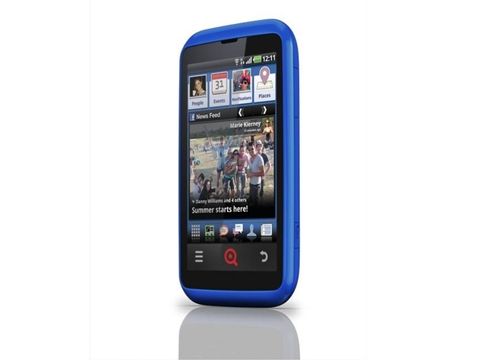Why you can trust TechRadar
INQ Cloud Touch review: Messaging
Messaging on the INQ Cloud Touch isn't as easy as it was on the older, non-Android versions of the INQ range. That's not to say it's tricky, but the main thing we miss is being able to send a Facebook message to a contact from your phone's address book.
There's also no integrated Facebook and Twitter inbox, in the same vein as the BlackBerry Torch, but that was hoping for a bit much given there are still Android constraints INQ has to work within.
At least the messaging types on offer are varied enough to be interesting to most users. Be it GoogleMail, Exchange, POP email or simple SMS, all are within easy reach and mostly just require an email address and password to use.
We had to faff about with the Exchange server, something we haven't had to do on an Android phone in a while, but a few settings later we were 'happily' downloading work emails to be told about spreadsheets that haven't been filled in.

As you can imagine, Facebook messaging is well integrated into the INQ Cloud Touch, with a dedicated icon to get you to that section of the application. It's nothing more than that, but the notifications when you get a new FB message are quick and easy to read, which is something many phones fail to do.
Another cool feature is Facebook Chat - we know that it's been offered through the updated Facebook application for a while now, but the dedicated icon and placement on the bottom row of icons makes it feel a lot more like a decent phone feature than another option in an app.
Facebook Chat is joined by MSN Messenger and Google Talk on the INQ Cloud Touch, making it one of the best IM phones on the market - if only BBM would make an appearance on the Android market, and this would be one of the best phones for sending poorly-spelled answers with emoticons to friends out there.
Now, onto the keyboard: and we're not sure what to make of this, so bear with us. If we described it as a much slower experience but one that's much more enjoyable, you'd think we were simply MAD... well, we're not.
Using the INQ keyboard, users start typing and a selection of words will come up as predictive text. Nothing odd there, but the phone is supposed to actually be intelligent enough to start learning what you commonly write and predict better words over time.

We've heard this claim before, but by Jupiter, it actually seems to work in this instance. It somehow knew that when we wrote 20th, we wanted to write June afterwards. Yes, it scared us, but in a cool way. There's even a little calculator to show you how many keystrokes you saved - over time that will get up to a massive 25% to 30%, which is pretty nifty.
You'll need to mess with the settings a little bit to make sure the autocorrect and auto accept settings are OK, but on the whole it's very well stocked.
However, and this is a real problem, the keyboard accuracy is a little bit dodgy. It's something you can learn to live with, but the light feel to the phone, coupled with the smaller screen, mean you'll spend a lot of time deleting if the word you want to write hasn't been predicted already - and over time, cooler text entry will always lose out to slower typing.
SwiftKey (the underlying software running the inuitive system) is working well and does the job that's made it a real winner on the Android market, but typing without it on the INQ Cloud Touch could still do with being a lot more accurate.
Current page: INQ Cloud Touch review: Messaging
Prev Page INQ Cloud Touch review: Calling and contacts Next Page INQ Cloud Touch review: Facebook
Gareth has been part of the consumer technology world in a career spanning three decades. He started life as a staff writer on the fledgling TechRadar, and has grown with the site (primarily as phones, tablets and wearables editor) until becoming Global Editor in Chief in 2018. Gareth has written over 4,000 articles for TechRadar, has contributed expert insight to a number of other publications, chaired panels on zeitgeist technologies, presented at the Gadget Show Live as well as representing the brand on TV and radio for multiple channels including Sky, BBC, ITV and Al-Jazeera. Passionate about fitness, he can bore anyone rigid about stress management, sleep tracking, heart rate variance as well as bemoaning something about the latest iPhone, Galaxy or OLED TV.

